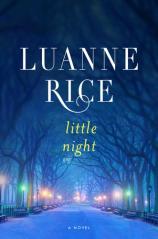Reading Group Guide
Discussion Questions
Little Night

1. Though she’s spent time in prison, Clare looks young for her age. The bartender at Clement’s reflects, “Prison usually bled the life out of a woman, burned off her beauty and intelligence, left her looking bitter” (p. 28). He compares Clare to his cousin who went in and out of prison for fifteen years and looked like a “wizened winter apple.” Why do you think Clare fared so well compared with the woman he describes? How was her situation different from those of most women in prison?
2. Clare says that her sister has always thrived on difficult relationships, that she needed “rockiness to test her loves and make sure they could take the worst of her, prove that they’d stick by her” (p. 100). What factors do you think contributed to her dysfunctional relationships? Recall some of Anne’s other relationships before her marriage. Could Clare have helped her before things got out of control? Explain your answer.
3. On page 107, the idea of lenchak is introduced. What are some other examples of lenchak that you can think of? Do you agree with Grit’s assessment of who is the owl and who is the seal? Why or why not?
4. Grit is concerned that she’s blowing out of proportion the feelings she has for her aunt. To be sure, she tests the aunt/niece feelings with Sarah. How do you explain the bonds that tie a family together? How are they different from friendship?
5. One of the things that first attracted Anne to her husband was his fiery passion for his art. In what ways might she have mistaken his abuse toward her as merely an extension of that passion?
6. Grit longs to assert the differences between her mother and herself. How does she go about it? Can a child ever truly overcome the mark left by his parents? Why or why not? Did you ever make it a point to behave differently from your mother or father? Were you successful?
7. How would you describe the relationship between Paul and Clare at the beginning of the novel? What are her reasons for shutting him out of her life? How would you characterize their relationship at the end of the book? What’s different? What do you think precipitated the changes?
8. Grit is concerned that Dennis might be an “emotional adventurer” (p. 213)—a seemingly well–adjusted person who thrives on the misery of others. What are her reasons for thinking so? Do you think he is? Have you encountered any emotional adventurers in your life? What were your experiences with him or her?
9. When Anne and Grit were together in Denmark, why does Anne observe her daughter from a distance rather than spending time with her? How do you think things might have ended up differently if she’d been able to have a healthy relationship with her children?
10. Do you believe what Grit says about what happened at the bog, that it was purely an accident? Why or why not?
11. Grit has always been frustrated by the “huge gap between what her mother wanted—or said she did—and what she was actually capable of doing” (p. 69). How has Anne’s abusive marriage affected her? Is it ever appropriate to assign part of the blame to the person enduring the abuse? Later, Clare says that Anne “doesn’t have a choice anymore” (p. 168). Do you think that’s true? Why or why not?
Little Night
- Publication Date: June 5, 2012
- Genres: Fiction
- Hardcover: 336 pages
- Publisher: Pamela Dorman Books
- ISBN-10: 0670023566
- ISBN-13: 9780670023561








